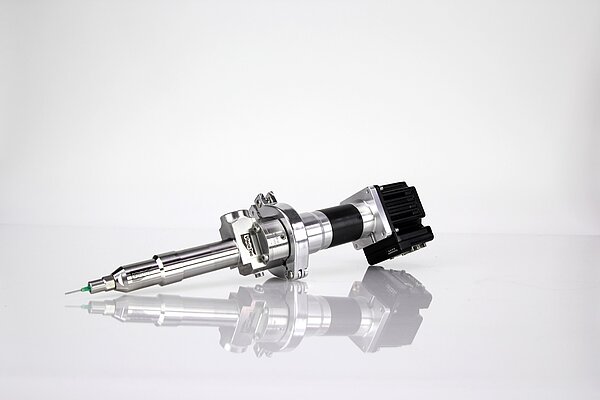DELO, one of the world’s leading manufacturers of industrial adhesives for automotive, consumer and industrial electronics applications, recently partnered with ViscoTec, a dispensing company that manufactures systems and components required for conveying, dosing, applying, filling and emptying medium- to high-viscosity fluids, to perform experimental tests analyzing adhesive abrasions to systems. The tests confirm that even highly filled adhesives can be dispensed reliably and precisely over the long term without causing mechanical abrasions to dispensing systems.
Are fillers difficult to dispense?
Automotive and electronics industries have a constant need to meet the ever-increasing demands found in temperature stability and media resistance. Because of this, and because properties like electrical or thermal conductivity or adapted expansion coefficients need to be achieved, adhesive manufacturers fill their products with additional raw materials like metal or minerals. These robust materials are considered abrasive and have been thought to be difficult to dispense. The recent tests done by DELO and ViscoTec has proven that assumption wrong.
ViscoTec used two of its dispensing units in the testing, eco-PEN and RD, with two elastomer stators each. Six epoxy resins from DELO with filler content between 25 – 50% were used.
The stators were placed in the adhesives for 168 hours. General chemical suitability for long-term contact was observed as well as the change in mass, the dimensional accuracy and the hardness and elasticity of the elastomers. No abnormalities or deviations from the tight production tolerances were found, eliminating the idea that chemical reactions between two components would affect results.
Testing dispenser resistance
Twenty-four long-term tests that included cyclic dispensing operations were performed. Each included two seconds of dispensing, followed by a one-second pause to simulate typical dispensing behavior of an automated manufacturing process. Just under 300,000 dispensing cycles make up each test series, corresponding to approximately 30 kg of dispensed adhesive for the eco-PEN dispenser and approximately 240 kg for the RD dispensers. Every 20 hours, three dispensing shots were weighed and compared over time. The test results confirmed accurate and repeatable dispensing for all test pairs.
Karl Bitzer, head of product management at DELO, said, “The tests show what we have seen in the field, that even hard fillers in combination with high filler contents do not impede reliable and reproducible dispensing of our high performance adhesives.”
Before and after the endurance tests, the rotors, made of hard chrome-plated stainless steel, and the elastomer stators of the dispensing units were measured. After 300,000 dispensing cycles, there was no sign of wear on the rotors and a miniscule sign of wear on the stators that fell within the tight manufacturing guidelines.
Manuel Paintmayer, relationship management material manufacturing at ViscoTec, said, “Permanently reproducible and accurate dispensing was possible for all dispensers and stators. This is made clear by the fact that despite the abrasive test media and the high number of dispensing cycles, our dispensing units did not reach the end of their lifetimes within the testing period. That is a really positive result for our customers that rely on these units to perform reliably for many cycles. The longevity of our units directly translates into longevity of our customers’ systems, keeping maintenance low and reducing replacement costs over time.”
Technical Specifications
- Two dispensers with two different elastomer stators each
- Six epoxy resins with filler content between 25 – 50%
- 24 combinations, each with 300,000 dispensing cycles






